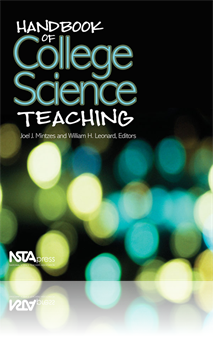All Resources
Book Chapter
Animations (rapidly changing sequences of drawn objects that simulate motion as in a movie) have been advocated for classroom use for years (Hall 1996...
Book Chapter
Instructional Technology: A Review of Research and Recommendations for Use
Carefully chosen and properly used instructional technology can increase student learning and student interest. Poorly used instructional technology c...
Book Chapter
Web-Based Practice and Assessment Systems in Science
In this chapter the authors describe the specific kinds of items that they have developed for use in automated practice systems and discuss some issue...
Book Chapter
Teaching Students to Evaluate the Accuracy of Science Information on the Internet
This chapter addresses the issue of variable accuracy of science information on the internet, how to address this topic in undergraduate science cours...
Book Chapter
Science, Technology, and the Learning Disabled: A Review of the Literature
The lack of research studies that examine the use of technology as a tool to support the learning of science among the learning disabled is an importa...
Book Chapter
Diversity in the Physical Science Curriculum: The Intellectual Challenge
In this chapter, the author argues that integrating science with the real and pressing concerns of human beings on this planet is a powerful way to gi...
Book Chapter
Incorporating Cultural Diversity Into College Science
Due to the globalization of world economics, advances in information technologies, and the complex interconnections of global environmental issues, po...
Book Chapter
Motivation to Learn in College Science
All college science teachers share the important goal of motivating college students to learn science. In this chapter, the authors discuss motivation...
Book Chapter
Applying Conceptual Change Strategies to College Science Teaching
This chapter will focus on meaningful learning and conceptual change from the perspective of science education. The authors describe in detail two cas...
Book Chapter
Ensuring That College Graduates Are Science Literate: Implications of K-12 Benchmarks and Standards
This chapter draws on some fundamental lessons learned about science teaching and learning at the K—12 level that are likely to be applicable to a h...
Book Chapter
The High-School-to-College Transition in Science
It is important to remember the variety of competing events and pressures that first-year students face while adjusting to a different life in college...
Book Chapter
Factors Influencing Success in Introductory College Science
Studies on the influence of pre-college factors on success in college science are well established. Most studies have been carried out in single insti...
Book Chapter
Assessment Practices in College Science: Trends From the National Study of Post-Secondary Faculty
The trend toward using performance-based or authentic assessment is evident at K—12 levels of schooling (Stiggins 1991) but less evident in college ...
Book Chapter
Making Choices About Teaching and Learning in Science
What exactly do we mean by civic engagement? Does it imply a way of thinking about knowledge in a democratic society? Or does it require personal acti...
Book Chapter
Science and Civic Engagement: Changing Perspectives from Dewey to DotNets
A prominent theme in current discourse about U.S. higher education is the goal of "civic" education. In this chapter, the author explores three relate...


